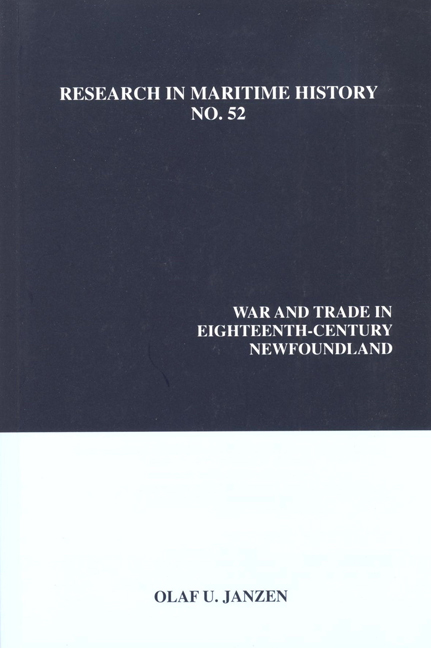Book contents
- Frontmatter
- Table of Contents
- About the Author
- Introduction
- “‘A World Embracing Sea:’ The Oceans as Highway, 1604-1815”
- “Of Consequence to the Service:' The Rationale behind Cartographic Surveys in Early Eighteenth-Century Newfoundland”
- “The Problem of Piracy in the Newfoundland Fishery in the Aftermath of the War of the Spanish Succession”
- “A Scottish Sack Ship in the Newfoundland Trade, 1726-1727”
- “'Une petite Republique' in Southwestern Newfoundland: The Limits of Imperial Authority in a Remote Maritime Environment”
- “The Illicit Trade in English Cod into Spain, 1739-1748”
- “Un Petit Dérangement: The Eviction of French Fishermen from Newfoundland in 1755”
- “The French Raid upon the Newfoundland Fishery in 1762: A Study in the Nature and Limits of Eighteenth-Century Sea Power”
- “Showing the Flag: Hugh Palliser in Western Newfoundland, 1763-1766”
- “The Royal Navy and the Interdiction of Aboriginal Migration to Newfoundland, 1763-1766”
- “The Royal Navy and the Defence of Newfoundland during the American Revolution”
- “The American Threat to the Newfoundland Fisheries, 1776-1777”
- Appendix
“The Royal Navy and the Interdiction of Aboriginal Migration to Newfoundland, 1763-1766”
- Frontmatter
- Table of Contents
- About the Author
- Introduction
- “‘A World Embracing Sea:’ The Oceans as Highway, 1604-1815”
- “Of Consequence to the Service:' The Rationale behind Cartographic Surveys in Early Eighteenth-Century Newfoundland”
- “The Problem of Piracy in the Newfoundland Fishery in the Aftermath of the War of the Spanish Succession”
- “A Scottish Sack Ship in the Newfoundland Trade, 1726-1727”
- “'Une petite Republique' in Southwestern Newfoundland: The Limits of Imperial Authority in a Remote Maritime Environment”
- “The Illicit Trade in English Cod into Spain, 1739-1748”
- “Un Petit Dérangement: The Eviction of French Fishermen from Newfoundland in 1755”
- “The French Raid upon the Newfoundland Fishery in 1762: A Study in the Nature and Limits of Eighteenth-Century Sea Power”
- “Showing the Flag: Hugh Palliser in Western Newfoundland, 1763-1766”
- “The Royal Navy and the Interdiction of Aboriginal Migration to Newfoundland, 1763-1766”
- “The Royal Navy and the Defence of Newfoundland during the American Revolution”
- “The American Threat to the Newfoundland Fisheries, 1776-1777”
- Appendix
Summary
Abstract
As a result of the Seven Years’ War, France lost most of its territorial empire in North America, including Cape Breton Island. At the same time, France reacquired possession of the tiny islands of St. Pierre and Miquelon off the south coast of Newfoundland. This acquisition was intended to provide France with a toe-hold in the North American fisheries, but for the Mi'kmaq Indians, France's former aboriginal allies in Cape Breton Island, the islands of St. Pierre and Miquelon became the only means by which they could maintain contact with the French. During the period 1763-1766, a significant number of Mi'kmaq therefore attempted to move into the Bay d'Espoir-Hermitage Bay area of Newfoundland's south coast, in close proximity to the French islands. This, however, was something that for various reasons neither the French nor the British desired, and so attempts were made to discourage the migration. Ships of the Royal Navy stationed in Newfoundland played a key part in patrolling the area, reporting on the movements of the aboriginals and attempting to enforce British policy restricting their presence in the region. This paper examines these efforts both as an expression of the Royal Navy's peacetime role as a projector of British power and as an agent in the process that eventually saw the aboriginals abandon their attempts to move to Newfoundland's south coast, settling instead in western Newfoundland. The paper is based on research into the activities and procedures of the Royal Navy in Newfoundland after 1763, research that has already led to a number of papers and publications over the years. The main source for this paper will be the documents in the Colonial Office 194 series and the Admiralty papers, held by the National Archives (TNA/PRO) in England.
Introduction
Although the eighteenth-century Royal Navy is best known for its activities in time of war, there has been growing interest in the navy's activities during the several periods of peace which interrupted the wars of that era. As the late David Syrett explained, those activities were “for the most part … a constabulary role to aid and support British foreign policy and overseas trade.”
- Type
- Chapter
- Information
- War and Trade in Eighteenth-Century Newfoundland , pp. 173 - 192Publisher: Liverpool University PressPrint publication year: 2013



